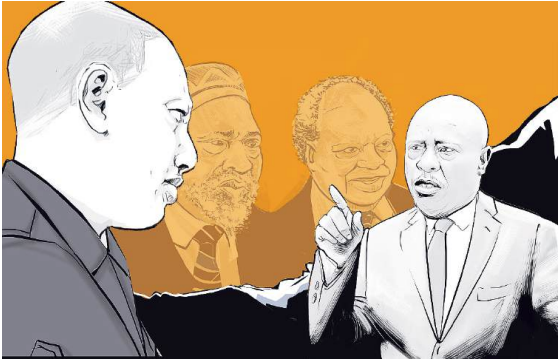

Former Deputy President Rigathi Gachagua’s anger has exploded into what he calls irreparable ethnic disconnection from the William Ruto presidency.
The disconnection resulted from what he calls the ‘betrayal’ of his people.
For the Mountain, he says, betrayal is an abomination.
These people voted for Ruto in the hope that they would be power partners for the next decade and beyond.
There was the silent message the DP would succeed the president, with a share of executive power.
The betrayal was not anticipated.
Gachagua’s notion of betrayal is a selective reading of post-independence history.
He recalls only the aspects of that history that flatter his political interests.
The selective memory is not surprising.
Anger blurs reality.
Jomo Kenyatta, the founding president, betrayed his compatriots, like Vice President Jaramogi Oginga Odinga.
The two fought for a common cause, which was dropped once power was safe in the House of Mumbi.
Ethnic oaths of 1966 and 1969 cemented the betrayal without the community standing up for Jaramogi.
The betrayal translated into the marginalised of a community to punish one man who cried “not yet Uhuru”.
President Kibaki rode presidential convoy beyond River Chania because of the support of patriotic Kenyans.
They wanted a break from President Moi and his legacy.
Raila was the deputy captain of the team that made it possible for Kibaki to win in 2002 after two failed attempts.
The contract of the 2002 engagement was discarded after Kibaki was sworn in as the third president.
Again the majority of the people who now claim to detest betrayal have not paid back Raila—their ‘Njamba Nene’ of 2002.
Kalonzo Musyoka, the ‘leader of the people’s loyal opposition’, joined Kibaki as his vice president in 2007, to neuter the crisis of electoral fraud.
But Kalonzo was sidelined from the succession queue.
Kibaki backed Kenyatta II to return the presidential standard to Gatundu, for the second time.
Kibaki’s betrayal of Kalonzo does not register in the radar of a community that abhors betrayal.
Gachagua’s betrayal is weaponised because he was a consolation prize.
Scions of the Mountain have controlled presidential power for 35 of 60 years since Independence.
Whenever a Kikuyu was not president, their son was either VP or DP.
The longevity in power created a sense of entitlement.
Gachagua was the closest the Mountain had of reclaiming State House.
The self-styled ‘Truthful Man’ from ‘Murima’ has reason to feel spurned.
He was evicted while on the climbing lane to political power.
The climb seemed assured, with a strong ethnic voting bloc to count on.
The anger is spreading fast because Gachagua is inconsolable.
Worse, his tormentors will not leave him alone to host as many supplicants as he desires at his Wamunyoro residence in Nyeri county, home of freedom fighter Dedan Kimathi.
Dedan Kimathi was the soul of the Mau Mua uprising of the 1950s.
Kibaki was also a scion of Nyeri.
The residential flag crossed River Chania, from Kiambu, through Kibaki.
Kiambu has been home of two presidents in a father-scion relay.
Gachagua, a son of the Mau Mau, wished a possible return of presidential convoy to Nyeri.
The advantage was denied because he was organising the Mountain around his ambition.
Gachagua did not learn from Moi.
Moi’s loyalty to President Jomo Kenyatta was beyond reproach.
Moi turned the other cheek even when juniors who had the eye of his boss slapped him.
Moi was appointive VP.
He held the office at the mercy of the president.
But Gachagua made it known he was elected on one ticket with the president, and was therefore constitutionally secured from dismissal.
He, however, forgot there is only one centre of presidential power.
OKECH KENDO
University journalism lecturer and climate change local actions advocate


